Reply To:
Name - Reply Comment
Last Updated : 2024-04-19 09:49:00
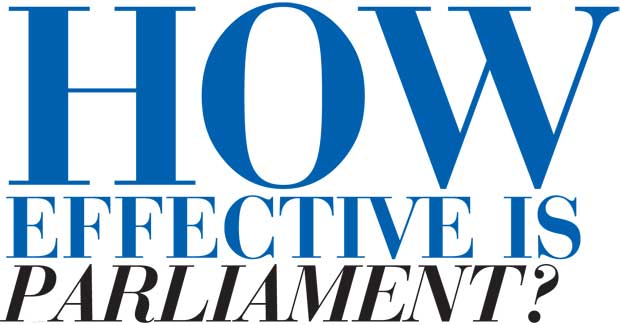
 arliaments in the past few decades have been weak, ineffective and neglected. Modernization and reforms in Parliament therefore are long overdue. In order to achieve a tangible progress, may I say, good governance should be built by developing quality institutions.
arliaments in the past few decades have been weak, ineffective and neglected. Modernization and reforms in Parliament therefore are long overdue. In order to achieve a tangible progress, may I say, good governance should be built by developing quality institutions.
The Parliament, which was simply an appendage of the executive, became a ‘rubber stamp’.
A political analyst has said that “It is accountability which is fundamental to a democratic system”. Any acts of the government are in the final analysis, acts of citizens themselves through their representatives.
How does this accountability work? How can we improve upon it so that we can create the best form 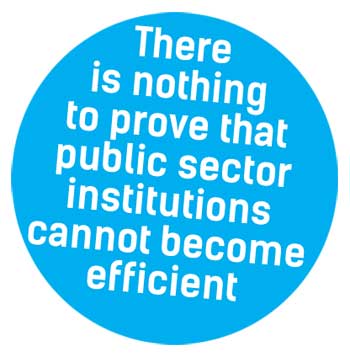 of Parliament? Parliament is the law- making body made up of elected politicians.
of Parliament? Parliament is the law- making body made up of elected politicians.
Parliament’s primary responsibilities therefore should be to ensure the government is made accountable, introduce and pass laws and debate issues to restore good governance and rule of law. Parliament is also responsible for examining government policy and running the administration for the benefit of the citizens.
The present government, in order to restore the supremacy of Parliament and to re-create the Independent Commissions, enacted the 19th Amendment and the Right to Information Act. Democracy, therefore is a living system of government that can only prosper by being reinvented again and again. Parliament should therefore ensure that the State is made accountable to citizens  and that service delivery is improved?
and that service delivery is improved?
For this purpose, the Prime Minister has already taken a giant step to introduce Sectoral Oversight Committees (SOCs) in Parliament having scrapped the Consultative Committee system. As a nation, shouldn’t we work to return to the original traditions in order that steps are taken to respect and observe Constitutional and other laws and individual rights much more seriously with LESS public spending, than we do at present?
The PM has therefore given instructions that members of the respective SOCs should also select their own Chair in Committees without gubernatorial influence, which I believe is another commendable decision by the PM.
Why did the PM do so? I have no doubt the PM is fully well aware that the most appropriate method of carrying out oversight functions effectively is by Parliamentary committees, which could track the work of individual government ministries, departments etc. Citizens also now demand better value for 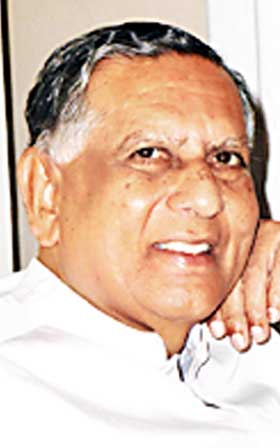 money. As such, Parliament is both a cause of poor democratic governance – and an integral component which requires vast improvements.
money. As such, Parliament is both a cause of poor democratic governance – and an integral component which requires vast improvements.
Shouldn’t the PM therefore propose radical improvements in Parliamentary administration, greater discipline and increased efficiency too? Shouldn’t the Premier concentrate on the neglected pieces of the puzzle? Providing improved services with less public spending is a challenge before the Parliament Secretariat.
Firstly, Parliament, which consists of elected representatives do not speak in one voice. Key officials, in political and administrative structure, are happier when there is confusion. They also do not learn Standing Orders or observe Parliamentary Practice and Procedures.
Secondly, are they capable, intelligent, dedicated and skilful individuals to turn the country around?
The majority of the elected representatives seem to lack dedication, attention and enthusiasm to play an effective role in legislation, oversight and representation.
Parliamentary strengthening therefore should be linked to enhancing the effectiveness of Parliamentarians.
Thirdly, does the Secretary-General (SG) agree that fundamental reforms are vigorously needed?
Does he have time and the desire to carry out close supervision to increase efficiency and effectiveness? The SG has travelled widely overseas and does he carry out cross-country comparisons of public spending efficiency together with outputs and inputs in his own secretariat? Do they monitor day-to-day progress?
Could he assert his authority to the staff to promote effectiveness by removing unnecessary complexities, uncertainties, red tape and all bureaucratic ills due to lethargy, negligence, inefficiency, corruption, high-handedness of staff. If not, why?
Does the staff attend to all types of private businesses having neglected their official duties with or without the SG’s approval while on duty?
They do not concern human resource management practices. The seniors always are keen to look after themselves and they had overlooked the non-monetary incentives, such as employee 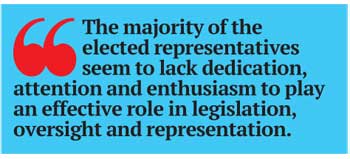 satisfaction and morale. The SG has ensured good wages, allowances etc. to the staff and they are the highest paid. There is also a high level of individualisation.
satisfaction and morale. The SG has ensured good wages, allowances etc. to the staff and they are the highest paid. There is also a high level of individualisation.
They operate on short-term without plans for long-term development. I cannot understand how they did survive that long though their existence is questionable, particularly on grounds of efficiency and effectiveness too. Shouldn’t they now have all the courage to embrace change and take creative risks to take this wonderful institution forward since the Prime Minister had pinned hopes that they would lead SOCs etc. to greater success?
According to the conventional view, the inefficiency of the Parliament Secretariat is due to several reasons.
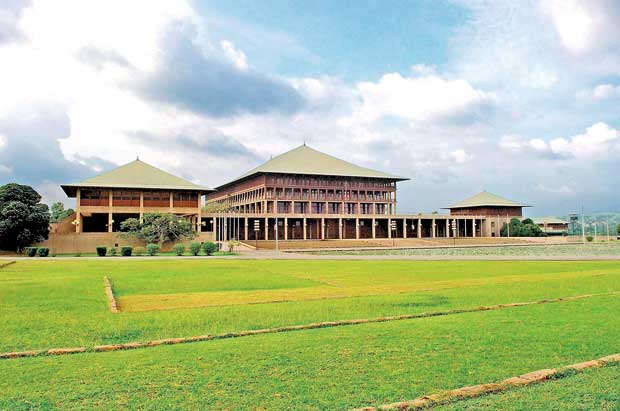
The secretariat is poorly managed due to inefficiencies and bad leadership. Motivating the Parliament Secretariat is nothing but leadership.
Elected representatives are heavily reliant on the Secretariat. It is the commitment, professionalism and dedication of the staff that could make the greatest difference in providing high quality service to the institution. However, I believe there is nothing to prove that public sector institutions cannot become efficient and well-managed.
Despite popular perceptions, Parliament staff long years ago had a culture of hard work, discipline, 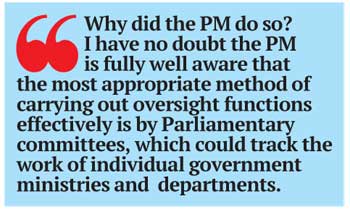 dedication to duty and personal integrity. They were then highly respected because they were dignified and impartial. How did such an independent institution become an unproductive wasteful organization unable to meet the goals before them.
dedication to duty and personal integrity. They were then highly respected because they were dignified and impartial. How did such an independent institution become an unproductive wasteful organization unable to meet the goals before them.
Frankly, how can they run the Institution efficiently, because the Secretary-General and the coterie are overseas half the year or more. In serving elected representatives, SG must not forget that they are serving the highest institution in the country.
Shouldn’t the Prime Minister look into the following aspects too for this purpose:-
(a) Parliament-government-civil society organizations interaction
Increasing the opportunities for civil society organizations to interact with Parliament and improving Parliament’s willingness to consult with those organizations are important ways to enhance an MP’s ability to represent his/her constituencies and to ensure that the national planning and budgeting process reflect the needs of the people.
(b) Parliament-constituency relationship and public accessibility
 Shouldn’t we use technology further to improve service delivery? Have we taken meaningful and sufficient steps to transform service delivery and bring about more convenience for the benefit of the citizens? Surprisingly, having created a new department for IT, we have not evaluated thoroughly how well an e-Parliament could be established without agonising delays. If improved, it would also reduce back-end paper processing and result in better auditing, security and data protection processes in the Parliament Secretariat. Why don’t they consider the outcomes such as cost savings and downsizing because we have expanded the staff heavily while spending billions. Isn’t this idiosyncrasy?
Shouldn’t we use technology further to improve service delivery? Have we taken meaningful and sufficient steps to transform service delivery and bring about more convenience for the benefit of the citizens? Surprisingly, having created a new department for IT, we have not evaluated thoroughly how well an e-Parliament could be established without agonising delays. If improved, it would also reduce back-end paper processing and result in better auditing, security and data protection processes in the Parliament Secretariat. Why don’t they consider the outcomes such as cost savings and downsizing because we have expanded the staff heavily while spending billions. Isn’t this idiosyncrasy?
(c) Parliamentary Reform Programmes
There had been several ambitious reform programmes commenced by the former Speakers, namely Joseph Michael Perera and Chamal Rajapaksa. Shouldn’t the Prime Minister call for reports as to why the relevant reform projects had failed.
In the past, Parliament had been the ideal establishment to be followed. Managing Parliament well is the responsibility of the Speaker and the Secretary-General. Both the Speaker and the Secretary-General should be imbued with qualities to lead Parliament to greater heights. The functions spelt out in the Constitution as regards Parliament should be carried out with competence.
The Parliament Secretariat should be the model for the rest of the public sector. Since the Parliament Secretariat had failed, the repercussions are felt all over the countryside.
I was entrusted with the responsibility of carrying out suitable reforms in my capacity as the then Director (Administration) by the former Secretary-General on the instruction of the former Speaker. An 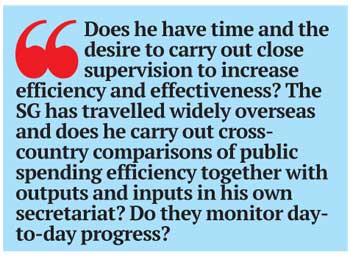 initial advance payment of a few hundred thousand had also been made to SLIDA too. Why have they stopped it halfway after my retirement?
initial advance payment of a few hundred thousand had also been made to SLIDA too. Why have they stopped it halfway after my retirement?
I believe measures that should have been introduced decades ago have all been swept under the carpet. May I add, my increments were suspended, letters of warning issued and sent on compulsory leave when I attempted to introduce change. Due to all that, the Parliament Secretariat now remains steeped in an imbroglio. Parliamentarians and Parliament are the fulcrum of a democratic political system. In these circumstances, how to help Parliamentarians to become more efficient, effective and responsive, by upgrading the performance of parliamentary secretariat, are the unresolved problems at this crucial juncture.
It is my firm conviction that we need an efficient and effective Parliament as a priority matter. I was therefore compelled to write this detailed article with sincerity thinking President, the Prime Minister and the Speaker would do the needful in order to create an effective Parliament -a prime requirement, to make their dreams come true, for the benefit of all Sri Lankans.

Add comment
Comments will be edited (grammar, spelling and slang) and authorized at the discretion of Daily Mirror online. The website also has the right not to publish selected comments.
Reply To:
Name - Reply Comment
On March 26, a couple arriving from Thailand was arrested with 88 live animal
According to villagers from Naula-Moragolla out of 105 families 80 can afford
Is the situation in Sri Lanka so grim that locals harbour hope that they coul
A recent post on social media revealed that three purple-faced langurs near t

10 Apr 2024
09 Apr 2024